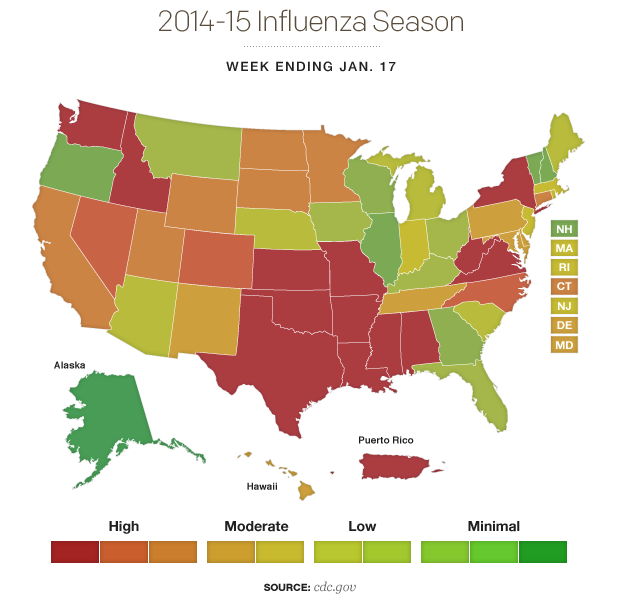Flu season hits some big states hard
Flu season may be starting to let up a bit in some parts of the country, but it's hitting a number of big states hard.
The latest update from the U.S. Centers for Disease Control and Prevention shows that the epidemic clobbered New York in recent days. In last week's report, flu activity in the state was "low," but since then it's skyrocketed into the red zone on the CDC map with high levels of illness.
California has also seen a significant surge of flu-like illnesses over the previous week. Other major hotspots on the flu map include Texas, which has been suffering through high levels of illness since late November.
The south-central United States; Virginia and West Virginia; Washington state and Idaho are also hard hit, and much of the western half of the country is nearly as bad. A total of 23 states reported high levels of flu-like illness, based on larger than usual numbers of people seeing their doctors with symptoms. Geographically, cases were widespread throughout 44 states.
But since the start of the year, illness levels have started declining in a many states in the eastern half of the country.
The CDC reports that in the week ending January 17, 11 children nationwide died of influenza. The outbreak has killed 56 children so far this season, slightly more than at this time last year.
People age 65 and over are far more likely than anyone else to end up hospitalized with serious complications from the flu, especially if they have underlying medical conditions like heart disease or obesity.
Since this year's flu vaccine has proven less effective than normal, it's more important than ever to take steps to try to avoid picking up the flu bug. The CDC offers these tips for flu prevention:
- Try to avoid close contact with sick people.
- Wash your hands often with soap and water or use an alcohol-based hand sanitizer.
- Clean and disinfect surfaces and objects that may be contaminated with germs like the flu.
- Avoid touching your eyes, nose and mouth. Germs spread this way.
- If you come down with flu-like symptoms, stay home except to get medical care. Don't go back to school or work until your fever has been gone for at least 24 hours.
- While sick, limit contacts as much as possible to avoid infecting others.
- Cover your nose and mouth with a tissue when you cough or sneeze, and don't leave used tissues lying around.
